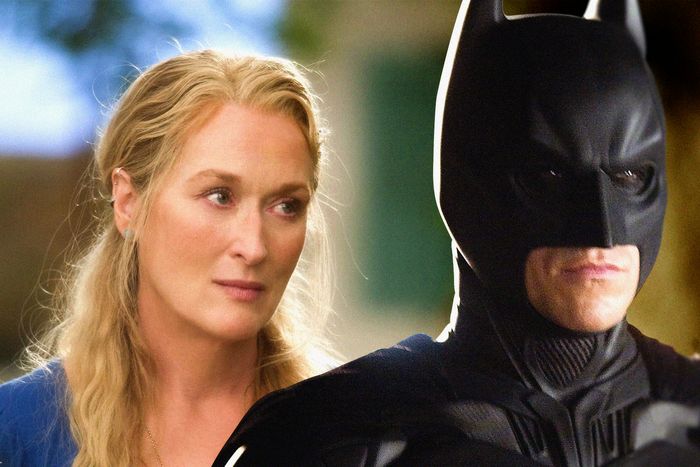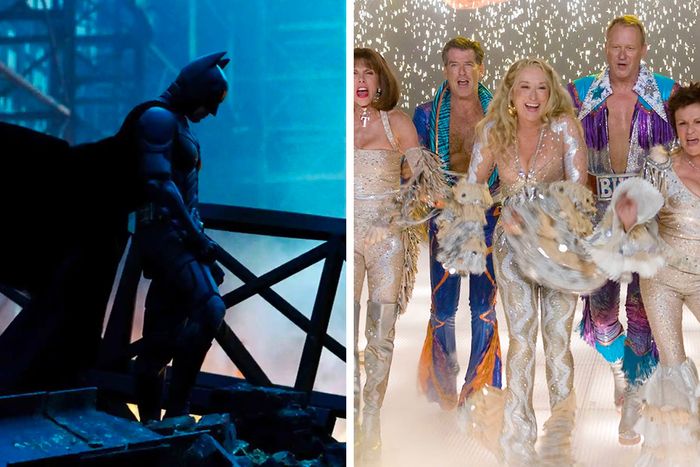
Welcome to the greatest multiplex showdown in recent history. In one corner, we have a long, brooding thriller directed by Christopher Nolan. In the other corner is a brisk, colorful romp filled with pop tunes. They share the same opening date in July, offering mutual counterprogramming for ostensibly disparate demographics. Only one can come out on top.
I’m talking, of course, about Oppenheimer and Barbie, two of the summer’s most anticipated releases. The much-memed competition between them is so fierce that it’s yielding material results: One industrious Twitter user blended the movies’ logos to sell a T-shirt that’s half Barbie pink and half Oppenheimer gray. On the websites Redbubble and Etsy, you can buy stickers, postcards, and shirts that say, prematurely, “I Survived Barbenheimer 2023.” And a not-insignificant number of moviegoers are booking Barbenheimer double features.
But I’m also describing a parallel contest from 2008: The Dark Knight and Mamma Mia! On July 18, those heavyweights went head-to-head and launched what was then the biggest non-holiday weekend Hollywood had ever seen. Fifteen years later, they remain some of the 21st century’s most beloved movies, as well as shining examples of the something-for-everyone approach that corroborates the industry’s creative potential.
No one doubted The Dark Knight would outgross Mamma Mia!, but the latter’s long-tail trajectory surprised even the executives who believed in the movie’s commercial capacity. The jukebox ABBA musical ended 2008 as the 12th-highest-grossing release domestically and the 5th-highest globally. (The Dark Knight was No. 1 on both charts.) This year, insiders aren’t sure the outcome will be so self-evident. Nolan is one of the few directors whose name alone sells tickets, but Oppenheimer is competing against a film with vastly greater IP recognition. A moody three-hour epic starring Cillian Murphy as the guy who designed the atomic bomb doesn’t scream summer smash the way Greta Gerwig’s exceedingly well-marketed sugar rush does. This time around, the Nolan flick might be the long-tail underdog. “I think Barbie will destroy it,” one former studio honcho predicts.
Selecting a film’s release date based on data about which genres appeal to which audiences on which weekend is standard practice, but rarely are the target demographics as divergent as they were between Warner Bros.’ The Dark Knight (the boy movie, to put it in superficial terms) and Universal’s Mamma Mia! (the girl movie, as it were). Sources from both studios say neither marketing campaign was expressly designed to address the other movie, but like those of Oppenheimer and Barbie, their polar-opposite aesthetics struck a chord.
The Dark Knight played the long game, not because Warner Bros. necessarily had to — 2005’s Batman Begins grossed a notable $373.7 million worldwide — but because doing so signaled a deeper commitment to the kind of 360-degree marketing that’s now routine in Hollywood. In addition to the usual TV spots and print ads, the Warner team tried more immersive PR. The most innovative aspect of the publicity blitz was an interactive campaign that let fans join the world of Gotham City. Nolan and Warner Bros. commissioned 42 Entertainment, a young Burbank–based company that had by then created alternate-reality games to promote Halo 2 and the Nine Inch Nails album Year Zero, to devise a yearlong viral stunt that sent people on a scavenger hunt through comic-book stores, websites, San Diego Comic-Con, and beyond. Along the way, participants could join the Joker’s “army,” vote in Gotham elections, and see teases about the movie. The game, dubbed “Why So Serious?,” reportedly engaged 11 million players in more than 75 countries, advancing the brand identity of the first big-screen Batman installment without “Batman” in the title.
“It dealt with activating this hard-core gamer-fanatic subset that felt culturally alienated,” says Gary Rosen, a 42 Entertainment alum who contributed to the project. “This was the Stonewall of gamers, where they finally realized, There’s people like me all over the world. Instead of them saying, ‘Oh, we’re going to help with the marketing of a Hollywood movie,’ it was saying, ‘We’re gonna take over the whole culture.’”
The ARG and subsequent promotions, including the film’s introductory bank-robbery scene that screened ahead of I Am Legend showings, emphasized the grittiness Nolan established in Batman Begins. “You want to ensure that the marketing represents the film properly so the audience can ease itself into the darkness,” a former Warner Bros. executive recalls of his team’s thinking at the time. The studio had done careful research to determine which weekend would be the most profitable, but moviegoers weren’t accustomed to Batman being that grisly. For The Dark Knight to work, people needed to be ready to see Heath Ledger’s Joker impale a dude with a pencil.
Another viral hub was emerging around that time: social media. On MySpace (yes, MySpace), The Dark Knight bought a home page splash with the potential to reach more people — 40 million per day, according to Jeff Berman, president of sales and marketing at the then-thriving site — than a TV spot could. The movie also got its own individual MySpace page, before that sort of thing was commonplace across Facebook and Twitter.
If Warner Bros. and Universal didn’t alter their messaging in response to their films’ shared release date, it’s because both campaigns already stressed the movies’ implicit differences. Mamma Mia!’s trailers and posters really wanted you to know it was a breezy musical full of blue skies and dancing queens. The stage show premiered in the West End in 1999 and moved to Broadway in 2001, rescuing ABBA’s ’70s bubblegum from the crucible of uncoolness. Universal looked at the movie musicals that had juiced the genre’s comeback in the 2000s (Chicago, The Phantom of the Opera, Dreamgirls, Hairspray, Enchanted) and opted to lean heavily on Mamma Mia’s sonic pep. The studio had another secret weapon in Meryl Streep, whose casting provided prestige.
“A joy-delivery device of that magnitude is always promising,” says a Universal source familiar with the marketing bid. “We were wide-eyed about what we were going up against. I don’t think we ever had the delusion that we would open to No. 1, but we could successfully coexist [with The Dark Knight]. We knew our core audience was probably older women and coastal gays. It felt like a relatively rational bet. We could have gone to a quote-unquote safer date in September, but we wanted to be a big summer event. If it achieved even a mid-level stratum of success, it was going to be okay.”
Instead of augmented reality, Universal concocted its own stunt. IKEA, a company that shares ABBA’s Swedish heritage and fondness for capital letters, agreed to partner with a Hollywood studio for the first time. Its stores played the trailer on a loop, offered ticket giveaways, hosted ABBA sing-alongs, and even threw a group wedding in Burbank. There, 20 couples exchanged vows in a ceremony emceed by The Bachelorette lovebirds Trista and Ryan Sutter. At the film’s Stockholm premiere that same month, the four members of ABBA made their first public appearance together since 1986. “It was one of the most memorable campaigns for a lot of us to work on because it was just such a pleasure,” says Kate Luczyc-Wyhowska, Universal’s senior vice president of international publicity.
Mamma Mia!, which bowed in the United Kingdom a week before it hit North America, earned a fraction of The Dark Knight’s opening domestic revenue — $27.8 million on roughly 3,000 screens compared to $158.4 million on roughly 4,400 screens — but it was the largest debut for a Broadway adaptation in history. “It’s no coincidence they landed on the same big weekend,” says David A. Gross, who runs the consulting firm Franchise Entertainment Research. “Attendance was big. There was no cannibalization. That can happen, but very, very rarely.”
Furthermore, Mamma Mia! gained screens as The Dark Knight shed them in subsequent weeks. Universal had been right: It was a word-of-mouth sensation. Over Labor Day, the studio released Mamma Mia! The Sing-Along Edition in select theaters. Altogether, the movie collected $144.1 million domestically and $609.8 million globally by the end of the year.
Oppenheimer and Barbie, opening July 21, are two sides of that same coin — severity versus sunshine, a pensive man with a sharp jawline versus an effervescent woman with flowing blond hair. But this battle royal has a juicy twist: Oppenheimer is the first film Nolan has made outside of Warner Bros. since Memento way back in 2000. That leaves the studio going up against a director who was once one of its steadfast loyalists. If Barbie wins the weekend, it will be a victory for post-Nolan Warner Bros. — and for an industry that no longer wants to be seen assigning higher value to male patrons than female ones. If Oppenheimer wins, Nolan’s indomitability remains firm. “There is a world where Barbie opens bigger but we play out longer,” the Universal source says. “I’m not sure the whole story is going to be told on the first weekend.”
For now, predictions are clear-cut. One box-office insider has Barbie tracking at twice what Oppenheimer will make at kickoff — $70–$80 million compared to $30–$40 million. The former is being boosted by more than 100 merchandising collaborations that Mattel has initiated in the lead-up. “The Oppenheimer dolls haven’t been selling very well,” jokes Jason Squire, professor emeritus at USC School of Cinematic Arts and host of The Movie Business Podcast. “As soon as you hear ‘Barbie’ and ‘Greta Gerwig’ in the same sentence, don’t part of your synapses go off?”
More on Barbenheimer
- Ryan Gosling and Emily Blunt Break Up with Barbenheimer on SNL
- Fallout Is Barbenheimer: The TV Show
- How Christopher Nolan Crafted the World of Oppenheimer


